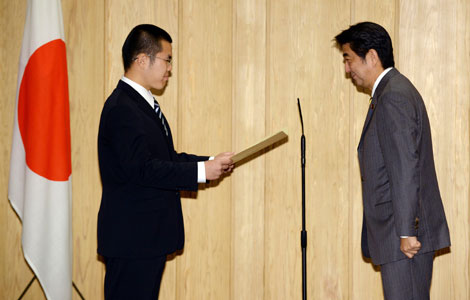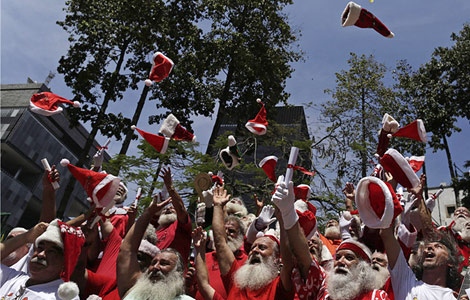

|
Christophe Trontine says Fete de la Musique is not just as a matter of offering performance venues, but getting strangers to combine efforts, arts and passions. Feng Yongbin / China Daily |
French bar owner taps into traditional beat of the drum
Deep in the heart of Beijing's historic Gulou area, a group of young Europeans makes their way slowly through the traditional hutong alleyways. They are in search of the sounds of joie de vivre from another musical tradition - the French one - but all they hear are those of traditional Chinese music from the many shops selling handicrafts from around the country, or from the street musicians, bowing on an erhu - a two-stringed fiddle.
But soon they find what they are looking and listening for, and are greeted by women in black T-shirts, some native Beijingers, some French expats. Their shirts and the flyers they hand out all feature the same red pagoda logo of the Fete de la Musique.
The fete, which began in France in 1982 to inspire people to take to the streets and share music, was being introduced to the Chinese capital for the first time as part of the Beijing Music Day.
The French Ministry of Culture has overseen its introduction to more than 100 countries, and on its 30th anniversary it was introduced to China among the shadows of the ancient Drum and Bell towers in the heart of the city.
The idea came from Christophe Trontine, co-owner of Tushuguan 98 (The Library Bar) in the Gulou area, and two French compatriots who are regulars in his bar.
Trontine has very fond memories of the Fete while growing up in Strasbourg, France, and wanted to recreate the fun and community spirit in China.
There is a certain raw energy that comes from people sharing in such an event, but Trontine says that music gatherings are very different from, say, football.
"You go there to support your team and there is also an element of antagonism toward the other teams," he says. "But when it is music, when it is a concert, everybody loves everybody. There is no place for any form of hate. I think that's really magical."
Trontine sips his coffee, sat in one of the overstuffed chairs that fills his bar. One wall is covered by a bookshelf - hence the bar's name. In the corner of the room a slightly raised stage serves as a performance space.
Just finishing rehearsing for the fete was Sylvain Martinez, French singer and guitarist of local rock band VHR, who were due to play at another fete venue.
Ideally, he says, the fete should be more spontaneous, with people coming on to the streets to play their instruments or sing along in a big parade or session.
"In France it is quite like this," Martinez says.
In Beijing, that wasn't possible, but the organizers still wanted to capture the essence of the ideal.
As it turned out, Beijing Music Day at the end of last month was marked by thunderstorms. But they did not put a damper on scores of performances by a variety of acts including, the Beijing Beatles and resident French singer-guitarist Byga.
But as in any concert, festival or cultural event these days, there is no show without business.
"We try to have as many live bands and live concerts as possible, but the real business is the bar from selling drinks and food," he says.
Trontine himself has spent much of his life as an expat, moving to Russia in 1993. "I was in market research and consulting, first in companies and then as a freelancer, so I was pretty mobile. I was traveling a lot in Russia and the former Soviet Union. It was a very interesting time."
But the cold northern winters got the better of him, particularly in the cities, where the snow quickly turned black in the streets.
"You barely got out of your home to go to work or to a meeting and your trousers were in a mess," recalls the elegant Frenchman.
Fed up, Trontine looked for a new home.
"I came to China for the first time in 2007, just to explore it, and I was really, really fascinated. I thought 'It's the place to be.' So I moved here in 2008, just after the Olympics. I started learning Chinese at university. Then I started this bar in February last year."
After spending many years in a job telling others how to run their companies, Trontine decided to go into business himself. He had become used to clients reminding him that he had no personal stake in their enterprises. "We are in business, you are not," they told him.
"Another aspect," Trontine says "is that when you are helping a company to become better and it does better, then you always regret that you are not part of this business."
In little over a year, he has seen his neighborhood blossom with new businesses. He lists five new bars nearby that opened after his. But he welcomes the competition.
"By having more and more venues, it makes the area more attractive and we all benefit from it," he says.
It also means more thought and effort is needed in making a venue more attractive to customers. In addition to Tushuguan 98's bookish theme, the bar stands out in other ways, making best use of its two floors and terrace.
"We can conduct several parties at the same time, with different music and different ambiance, and people moving from one to the other."
Trontine also runs a stand-up comedy night once a week. He will probably never get round to performing his own routine, hampered as he is by a lack of material. For nothing very funny happened to him on the way to Beijing.
Reflecting on the hurdles of moving to a new country, as well as opening a new business, Trontine says:
"It's probably less heroic than it sounds. In Europe, all the countries claim to be business friendly and supportive of job creation, but actually they're not. As soon as you start something, you start paying, regardless of what your business is actually making in that time. Here, it's different. They helped me and made it easier for me to start a business."
C'est la vie.
For China Daily
(China Daily 07/06/2012 page29)







